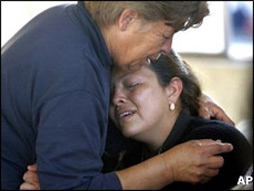 |
 |
 |
 News Around the Republic of Mexico | February 2006 News Around the Republic of Mexico | February 2006  
Company Says Mexican Miners Could Not Have Survived
 Olga R. Rodriguez - Associated Press Olga R. Rodriguez - Associated Press


| | Family members of the trapped miners react at the Pasta de Conchas coal mine in San Juan de Sabinas, Mexico, Saturday, Feb. 25, 2006. |
San Juan De Sabinas, Mexico Toxic gas levels inside a northern Mexican coal mine are too high for any of the 65 miners trapped inside to have survived a nearly week-old explosion, the mining company said Saturday.

The government and scientists previously said there was little hope any of those missing would be found alive.

But an analysis of underground air on Saturday showed it was too poisonous to breathe, said Xavier Garcia, president of Industrial Minera Mexico, a subsidiary of mining company Grupo Mexico SA de CV.

From the period of rescue we have now come to recovery, Garcia said, his voice cracking.

A pre-dawn explosion Feb. 19 that left the miners trapped sparked temperatures reaching 1,110-degrees Fahrenheit and released heavy amounts of methane gas and carbon monoxide that spread to every corner of the Pasta de Conchos mine, Garcia said.

The atmosphere inside the mine changed instantly, converting to an environment of high concentrations of methane and carbon monoxide and leaving the presence of oxygen at almost nil, he said. These conditions made survival impossible.

From the day after the explosion, chances for survival did not look good. Those trapped were only carrying a small supply of oxygen and each passing day without food or water made it harder to believe anyone would be pulled out alive.

Still, rescuers many miners themselves were careful not to trigger further explosions as they dug for six days in hopes of finding survivors or the remains of those killed.

They were ordered to stop their efforts Friday, however, amid concerns the air inside the mine, near San Juan Sabinas, 85 miles southwest of the U.S. border at Eagle Pass, Texas, put their lives in danger.

Teams of experts drilled holes into the mine Saturday to release toxic gases, and a team of foreign experts including 10 officials from the U.S. Mine Safety and Health Administration analyzed the air and found it was unbreathable, Garcia said.

Conditions inside the mine would likely improve enough for rescuers to return in about two days to the area where they had already been working, Garcia said. It was unclear when they might be able to advance further and search for the bodies of those killed.

Many of the 600 family members who had taken up residence in a tent city outside the mine went home after the suspension of rescue activities, physically and mentally spent after seven days of desperate emotions and bitter nighttime cold in the windblown desert outside the town of San Juan de Sabinas.

But about 50 stayed behind, voicing fears that the suspension might lead to a permanent suspension of rescue activities. There were about 100 relatives waiting outside the mine late Saturday, when company officials began summoning them in small groups to the mine's administrative offices.

Family members then left the offices crying and huddled together under tents, a foreshadowing to the official announcement that would come a short time later.

Jose Luis Silva, 20, said he refused to believe his missing father was among the dead.

Faith and hope are the last things to go, he said. I won't lose mine until they turn his body over to me.

Labor Secretary Francisco Salazar said he would work with Grupo Mexico and the state government to ensure the families those killed left behind each receive a new home.

In a statement Friday, Grupo Mexico said it will give the 65 miners if they were found alive the equivalent of 10 years of their annual salary, or about $75,000. A company spokesman said if the miners are found dead, the families would receive the payment. | 
 | |
 |



